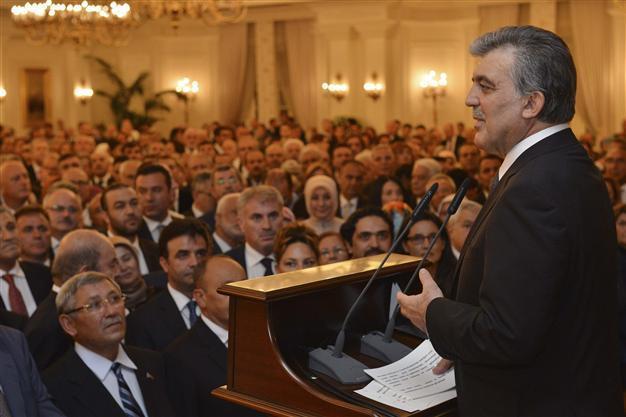Turkish President Gül leaves office with broken heart
Serkan Demirtaş ANKARA

Turkey's President Abdullah Gül makes a farewell speech during a reception at the Presidential Palace of Çankaya in Ankara, Aug. 19. Presidential Press Office photo
President Abdullah Gül and First Lady Hayrünnisa Gül are departing the Çankaya Presidential Palace after seven years in residence with a sense of sadness following what they term “disrespect” on the part of some pro-government publications.This resentment comes not only because President-elect Recep Tayyip Erdoğan has closed the doors on Gül’s return to the Justice and Development Party (AKP) but also because of a smear campaign against the president and his staff at the presidency. The couple has declared the campaign “a display of disrespect and rudeness,” while adding that they were particularly hurt because the campaign was driven by “the newcomers of the political cause they belong to.”
“To be honest, I have observed a considerable amount of disrespect from our neighborhood in the last process. I have followed all of them. Everybody around me was doing his or her job in the framework of an impartial presidency,” Gül told Ankara bureau chiefs on the sidelines of his last farewell reception on Aug. 19.
Gül referred to an ongoing smear campaign against his closest advisers through the pro-government media that was increased in recent months after the outgoing president hinted at his intention to return to his AKP. Gül was among the founders of the AKP along with Recep Tayyip Erdoğan in 2001. He was elected as president in 2007 after which he was forced to cut his links with the party in line with constitutional requirements.
“Those who know me are well aware of my behavior. Those who don’t know me, or those who have only recently entered our neighborhood or those who don’t know the past very well are speaking shallowly about these issues. I will just let them recall their disrespect, and that’s all,” Gül said.
The “neighborhood” Gül refers to is the AKP, while the topic of his criticism is the party’s younger generation, which Gül and other veteran politicians would like to prevent from joining the executive board. Young cadres have been intensely lobbying for Foreign Minister Ahmet Davutoğlu to become the next chairman and prime minister to succeed Erdoğan.
Following Gül’s chat with journalists, Hayrünnisa Gül, who was accompanying the president, also found time to talk with media representatives. Unlike her husband, she did not hide her deep disappointment over the recent smear campaign against them, saying: “He [President Gül] does not respond to these criticism because of his politeness. We feel very offended because of some recent media coverage. I have never felt that sorry in my life as I have in this period.”
Hayrünnisa Gül displayed her unease during the reception as she refused to shake hands with two pro-government journalists, Abdülkadir Selvi of the Yeni Şafak and Mehmet Akarca of ATV.
Gül reveals Davutoğlu as next PM
In an ironic development, Gül became the highest-level Turkish official to name Davutoğlu as the next AKP leader although the party has not yet announced the decision. Gül recalled that it was him who introduced Davutoğlu to Turkish politics and stressed that he was sure Davutoğlu would be very successful as prime minister.
Asked about his post-presidency career, Gül preferred not to give details but said he would move to Istanbul as he has no intention of staying in Ankara, known as the heart of Turkish politics. Recalling that as his presidency is drawing to a close, Gül said he could return to politics with the AKP but did not detail how he would return to his party.
“I will try to share my experience and my knowledge for my party’s success that I have founded,” he said. “The success of Turkey belongs to all of us. I will move just like people who have served as presidents in the world.”
Controversy over Erdoğan’s prime ministry
Meanwhile, controversy is continuing over the official end date of Erdoğan’s term as prime minister. The prime ministry has reportedly prevented the publication of the Official Gazette for the last five days in a bid to delay the official announcement of Erdoğan’s presidency.
“The decision as to when one’s status as lawmaker ends or does not does not belong to the presidency. There are customs on this. We have studied all of these. There are discussions about it and I am following them. But we are not the right institution to decide on one’s status as a lawmaker,” he said. “Therefore I am not going to move in any way to create chaos.”
Gül opposes presidential system
Touching on the debate as to whether Turkey should adopt the presidential system, Gül said he made his views clear when the issue was debated and reiterated that he preferred the current legislative system.
“Of course, no one can argue that the presidential system is not a democratic system,” he stated, underlining that the most important thing in such systems was to maintain the balance of the system by protecting the consistency and the principle of separation of powers. “At the end of the day, whichever system you select, it will enter into force after the people’s approval.”
















